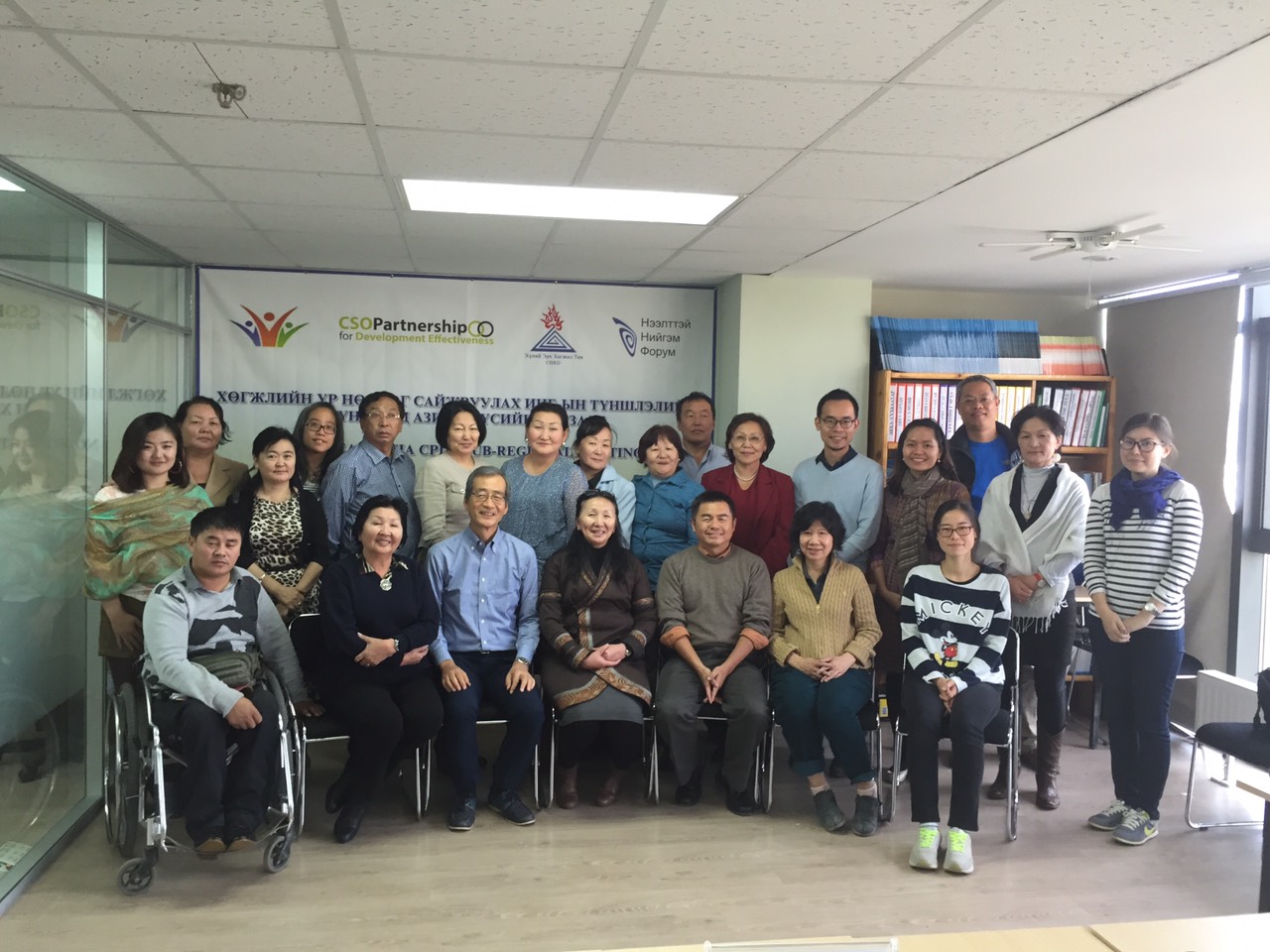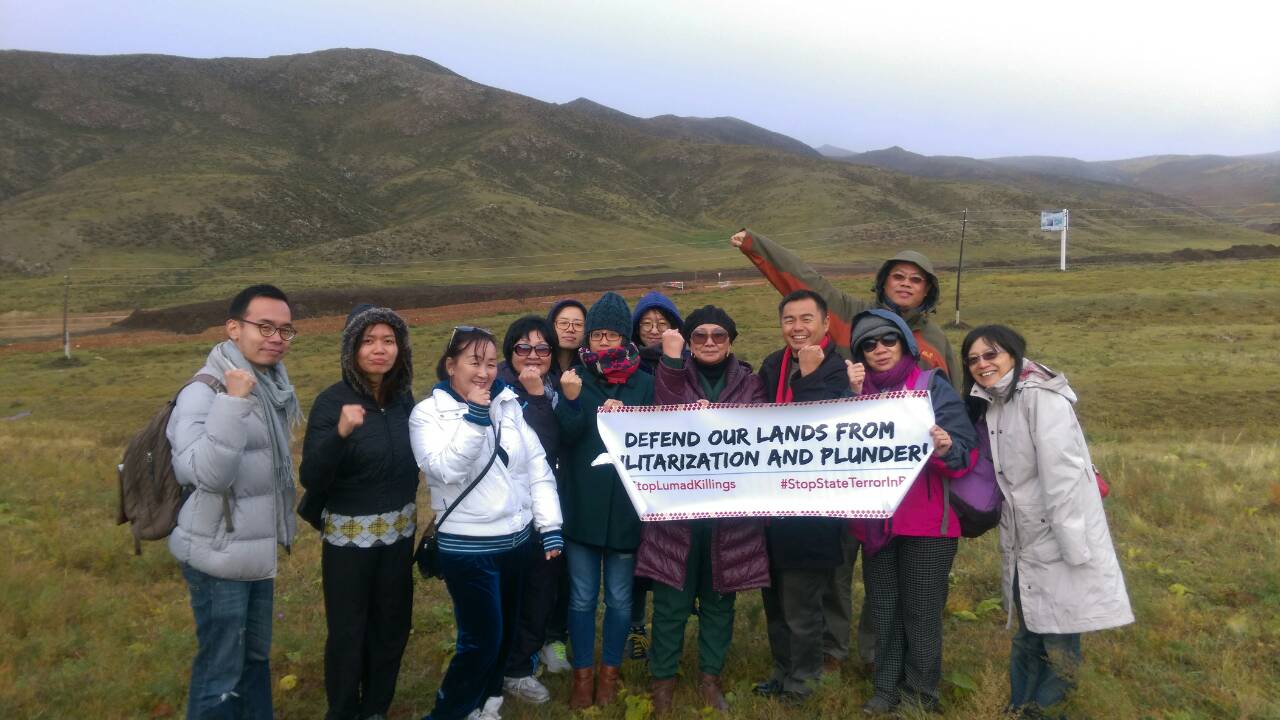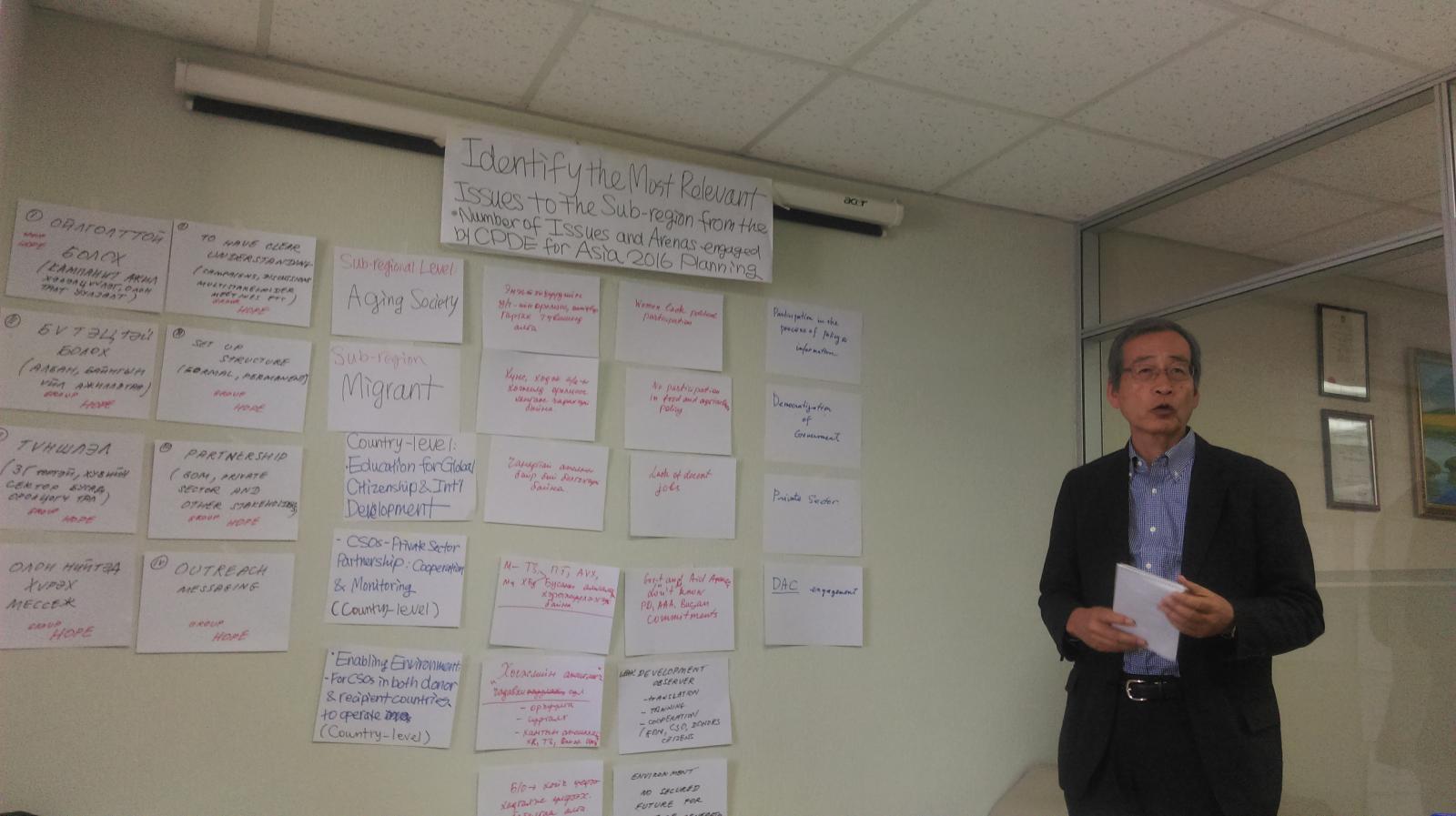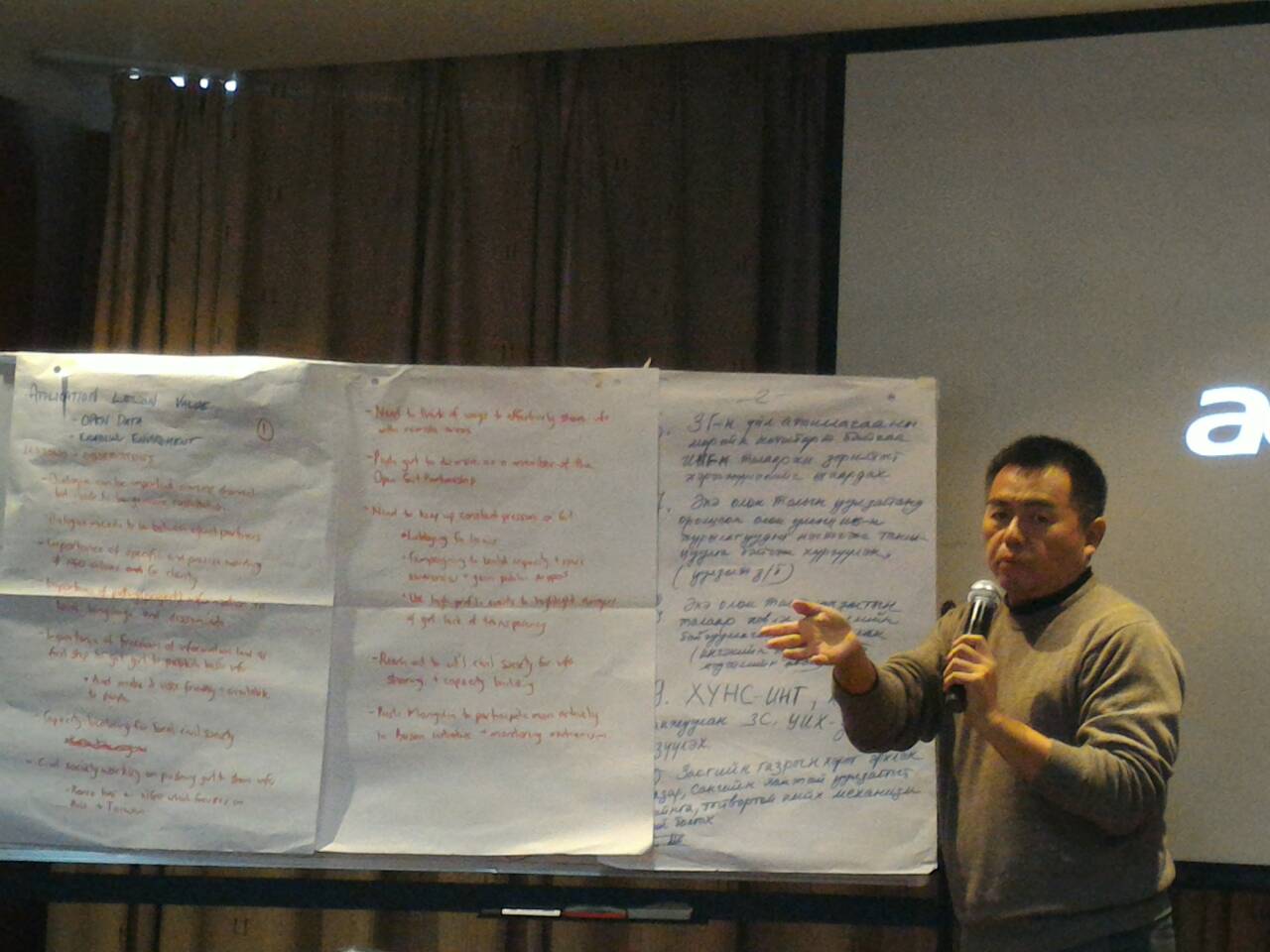
文/秘書處
CPDE(CSO Partnership for Development Effectiveness)是全球公民社會組織平台,致力於推動有利環境(Enabling Environment, EE)、發展效能(Development Effectiveness)及人權基礎方法(Human Rights-based Approaches, HRBA)等國際發展議題。該平台於全球各區域定期召開會議,其中東北亞次區域包括台灣、日本、韓國、中國及蒙古等五國。
今年的CPDE東北亞次區域年會由蒙古國主辦,會議主題聚焦在國際援助的有利環境及公民社會發展,共有5國(日本、韓國、台灣、蒙古及菲律賓)、約30位代表參加。由於主辦國蒙古近年來因為開發礦產使得經濟大幅成長,但卻造成環境汙染及貪污舞弊事件,公民社會雖然積極尋求改善方法,卻受限於不透明的法令政策制度而無法推動改革,因此如何創造一個有利於公民社會及國際發展的政策環境,成為本次會議的重點。

(圖:本次CPDE東北亞年會共有5國、約30位CSO代表參加)
蒙古:環境與資源開發產生衝突 CSO有利環境(EE)亟待提升
蒙古近年來雖然因為大量開採礦產及天然資源,使得經濟成長率快速提升,但是政府在與跨國公司簽訂開採契約時,卻提供極不合理的免稅優惠,使得政府無法因開發礦產而增加國家稅收,並傳出許多官商勾結等貪污腐敗案件;更嚴重的是,礦產開發過程中所挖出的巨大坑洞會阻擋遊牧民族的遷移路線,更因為開礦所排出的廢水直接進入地下水源,嚴重威脅當地民眾的身體健康。而當CSO想要透過查詢相關資料,向政府倡議或舉辦活動,呼籲公民大眾關注這個議題時,卻經常遭到阻礙、甚至恐嚇,更凸顯開放資料、透明政府等有利環境的建立,是當前蒙古政府和社會最重要的挑戰之一。

(圖:參訪團前往礦坑實地訪查,後方即為礦場)
韓國:政府能源外交造成受援國汙染 CSO擴張國際服務方案但品質難掌握
韓國政府近年來推動能源外交,在發展中國家以合作為名義進行能源開發,引起許多人權和環境保護爭議,例如韓國政府透過注資亞洲開發銀行(ADB)提供3.15億美金,在菲律賓宿霧(Cebu)以韓菲兩國合資的形式,興建發電廠,但卻造成當地嚴重的污染。本次與會的韓國CSO代表認為,韓國政府一方面簽署國際協議,承諾國際援助工作需符合人權標準,另一方面卻又以資源開發的名義汙染當地環境,顯示出政策上並不一致。
在促進CSO落實伊斯坦堡原則方面,韓國CSO近年來在政府協助下,積極擴張國際援助方案,但快速的推展方案規模卻造成服務內容品質不佳的問題,例如許多CSO仍以慈善(Charity)心態進行國際援助,在責信、夥伴關係等原則上皆有不足,是未來需特別關注的地方
日本:CSO與政府已建立制度化諮詢管道 政府ODA著重促進南南合作
日本政府近年來的國際援助政策方向,著重在加強三方合作(Triangular Cooperation),特別是加強與中等收入國家(Middle-income Countries, MICs)合作,並促成中等收入國家與低度發展國家(Least Developed Countries, LDCs)的合作,例如由日本主導墨西哥與薩爾瓦多的合作方案。此外,日本CSO和政府間的溝通管道較為完善,CSO倡議的成效也相對較佳;除了透過制度化的諮商機制,也促成日本國際協力機構(JICA)發布網路版的國際合作資料,並讓官方在正式文件中提及伊斯坦堡原則的重要性。

(圖:日本CSO代表、日本世界展望會會長片山信彦先生分享日本經驗)

(圖:Taiwan AID理事洪智杰主持會議)
推動國際援助的有利環境 需要更多公民的關注與支持
相對於蒙古和其他開發中國家,台灣經過民主化的洗禮,法律和政策等制度環境相對有利於國際援助工作的開展;但若要持續的進步和改善,仍然需要更多公民的關注和投入。Taiwan AID持續關注有利環境的議題,舉辦「有利環境工作坊」並翻譯工具書,推動CSO和政府及公民社會之間的對話,讓更多公民及大眾關注國際援助的法制及政策環境,提升台灣對外援助的整體效能。公民的關注與支持,是台灣國際援助工作持續向上提升的動力,也是Taiwan AID未來最重要的工作項目之一。
附件:2015 CPDE東北亞次區域年會會議決議「烏蘭巴托共識」(Ulaan Baatar Consensus)
Consensus Statement from the
CSO Partnership for Development Effectiveness
Northeast Asia Meeting 2015
Ulaanbaatar, Mongolia, 24thto 26thSeptember, 2015
Final Version
We the participants of the CSO Partnership for Development Effectiveness Northeast Asia Meeting who met in Ulaanbaatar, Mongolia for three days from 24thto 26th September, 2015
1. recognizing and building on the results of previous sub-regional meetings;
2. expressing our deepest gratitude to the Development Observer CSO Open Forum (Mongolia) for hosting the meeting and organizing the Multi-stakeholder Forum and the study tour to Zaamar Soum of Central Province;
3. and after learning about the latest situation on civil society engagement and implementation in the Busan Commitments and the Istanbul Principles; and moving towards consensus on actions to strengthen sub-regional structures and capacities;
4. consensus is reached on the following statement:
(1) We confirm the GPEDC process, the commitments made in Paris, Accra, Busan and Mexico, and the Istanbul Principles as building blocks on the path to achieving a global consensus on the post-2015 development agenda. We also recognize the efforts that have been made by civil society in implementing the Busan Commitments and the Istanbul Principles.
(2) We realize that there is much work to be done to raise the awareness, understanding and support for the above among the general public, government, private sector, and even many civil society organizations (CSOs).
(3) We urge fellow CSOs, as well as our partners in the public sector, private sector and donor agencies, to recognize the importance of the Istanbul Principles and the Busan Commitments through measures such as multi-stakeholder dialogues.
(4) We support actions by CSOs to implement the Istanbul Principles and Busan Commitments, including the ten recommendations for the ODA Charter revision submitted by JANIC to the Japanese government, monitoring of the climate change policy of Korean government by the Korea Civil Society Forum on International Development Cooperation (KoFID), the comprehensive research project of Taiwanese NGOs working in International Development conducted by the Taiwan Alliance in International Development (Taiwan AID), and the capacity-building efforts carried out by the Mongolian CSO Open Forum ‘Development Observer’.
(5) We are concerned about attempts to expand the definition of official development assistance (ODA) to include private sector investment, paramilitary and military spending. We also urge governments to fully commit to the 0.7% ODA/GNI target.
(6) We urge governments to recognize the role of CSOs in policy development and ensure genuine participation of CSOs in decision-making processes that can lead to actual policy changes.
(7) We demand governments and other stakeholders to abide by democratic and good governance, including making detailed, timely and regular data and information on ODA and national development open and available to the public.
(8) We recognize the need for provision of related supportive measures to conduct independent monitoring and assessment of ODA to improve development effectiveness.
(9) We confirm that the following 8 issues will be our priorities in the Northeast Asia Sub-region:
a. Enabling Environment;
b. Coping with Aging society;
c. Private Sector Accountability;
d. Democratic Governance, Transparency and Accountability in the Development process;
e. Conserving nature for future;
f. Effective Participation of CSOs at all levels;
g. Creation of Decent Jobs to reduce migration;
h. Provision of wide range education to all parties ensuring international development.
(10) We urge the CSO Partnership for Development Effectiveness (CPDE) secretariat to provide more information about the sector-related TOR, organizing structure and activities before next Sub-regional meeting for further discussion.
(11) We nominate Japan, Mongolia, South Korea and Taiwan as the designated program countries in Northeast Asia for CPDE.
(12) We decide to hold the next sub-regional meeting in Taiwan in 2016 and include special sessions on Post-2015 and emerging economies.
(13) We will explore all avenues to raise funds for the above activities.
(14) We elect Jay Hung to be the focal point of the Northeast Asia region and consult with China (First) or South Korea (Second) to be the alternate.